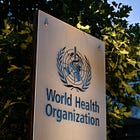The Gift of Sickness
If all life was perfect, there would be no growth, healing, or repentance.
Dear Healthy Jew,
Last week we learned the World Health Organization’s definition of health as a “state of complete physical, mental and social well-being, and not merely the absence of disease or infirmity.”
Let’s try now to appreciate how health is indeed a positive thing, not merely the lack of any apparent sickness.
Life Without Sickness
Imagine a world where every form of life was either doing great or simply gone. Plants, animals, and people are born, grow, procreate, until one day – boom, they collapse in a decaying heap of organic molecular compounds.
In such a world, both health and sickness wouldn’t be words, because every being is either fully alive or dead as a doorknob. Foods wouldn’t be healthy and unhealthy – how could they be if sickness doesn’t exist? – but would be sharply divided between nutritious and deadly.
Without health and sickness, life couldn’t advance from imperfection toward wholeness. Pursuing wholeness implies present lack, and if lack automatically means oblivion, there would be nobody missing anything from life who can go and seek its fullness. Life wouldn’t be a spectrum but a point on a line that one dare not cross.
Gratefully, life does exist in two general varieties, so it’s possible to get something wrong today and fix it tomorrow. Today’s choice might make us sick, but tomorrow we can heal and regain the fullness of health.
Life is a large playing field with myriad possibilities of health and sickness, wholeness and lack. And most of its players aren’t perfectly healthy or hopelessly sick but have aspects of both completion and defectiveness. Living well means investing effort to achieve and maintain complete health, not merely avoiding immediate death.
Soul Health
This duality of life applies to the soul as well as the body.
In fact - full disclosure here - I first learned about life’s two tiers from Rabbi Moshe Chaim Luzzato (1710-c.1746), one of Jewish philosophy’s prominent scholars, who presented them to explain how God created a world that contains both good and bad.1
To make a very long story short, it’s theologically impossible for God to create evil – He and all His actions are perfectly good – but He can give life that lacks the necessary conditions for its full expression, and then allow that incomplete life to seek and achieve completion as a second level of life.
On the purely physical level, which is the final expression of creation, these two stages of life are known as health and sickness. But at their roots beyond the material world, Luzzato explains, these same two creations of life from the Creator are spiritual concepts of morality: bad and good.
Because both good and bad exist in God’s world (like health and sickness), people can choose wrong without immediate annihilation, which opens the possibility for repentance and punishments – the healing processes of the spirit. On the other hand, good spiritual living (the better option) means choosing to grow toward wholeness from the beginning.
(Luzzato continues to explain pretty much everything about the human condition and moral philosophy based on this dichotomy of health and good as opposed to sickness and bad.)
We’re beginning to appreciate health as the completion of life, the healing process of both body and soul. There’s no better time of the year for these reflections: during these Ten Days of Repentance, we work to heal heal our souls, to become fully alive.
Next week we’ll apply what we’ve learned to our modern concepts of health and disease.
Thank you for reading Healthy Jew.
Here are 2 great paths to continue the journey:
Also check out this intro and index to explore hundreds of posts about our 3 Healthy Jew topics: Wellness with Wisdom, Land of Life (Israel), and Sensible Spirituality.
Finally, always feel free to reach out here with any comments, questions, or complaints:
I look forward to hearing from you!
Be well,
Rabbi Shmuel Chaim Naiman
See Da’as Tevunos 128-130








